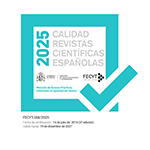No solo el 23F. El PSOE y la racionalización autonómica (1978-1982)
Resumen
La firma de los Acuerdos Autonómicos por parte del PSOE y UCD en julio de 1981 ha sido interpretada tradicionalmente como consecuencia directa del frustrado golpe de Estado del 23F. Este artículo revisa este análisis a partir de documentación interna e inédita, atribuyendo la toma de posición del Partido Socialista, no solo a una reacción frente la intentona involucionista, sino como producto de un proceso mucho más amplio, iniciado tras la aprobación de la Constitución. Los socialistas, condicionados por su trayectoria ideológica, fueron elaborando una política en materia autonómica que estuvo marcada por la coyuntura y que dependió tanto de los avatares del contexto estatal como de los que afectaron a los procesos autonómicos de cada territorio. Cuestiones estratégicas, electorales, ideológicas y una actitud que trataba de conciliar posiciones relativas a la responsabilidad de Estado con el mantenimiento de promesas sobre las demandas de autogobierno, interactuaron retrasando un pacto sobre el que se debatió desde que el nuevo marco legal dejara abierta la nueva estructura del Estado. En esta investigación se analiza la coincidencia entre centristas y socialistas sobre la necesidad de racionalizar la construcción del futuro Estado de las autonomías desde 1979. De hecho, armonizar el proceso autonómico fue un objetivo fundamental en el PSOE mucho antes de que el 23F ofreciera a los socialistas la oportunidad idónea para alcanzar un acuerdo de Estado con el que diseñar un modelo coherente con los principios que el partido había defendido desde el inicio de la Transición.
Descargas
Licencia
Aquellos autores/as que tengan publicaciones con esta revista, aceptan los términos siguientes:
a. Los autores/as conservarán sus derechos de autor y garantizarán a la revista el derecho de primera publicación de su obra, el cuál estará simultáneamente sujeto a la Licencia de reconocimiento de Creative Commons Reconocimiento-No comercial-Sin obra derivada 4.0 España que permite a terceros compartir la obra siempre que se indique su autor y su primera publicación esta revista.
b. Los autores/as podrán adoptar otros acuerdos de licencia no exclusiva de distribución de la versión de la obra publicada (p. ej.: depositarla en un archivo telemático institucional o publicarla en un volumen monográfico) siempre que se indique la publicación inicial en esta revista.
Plagio y fraude científico
La publicación de un trabajo que atente contra los derechos de propiedad intelectual será responsabilidad de los autores/as, que serán los que asuman los conflictos que pudieran tener lugar por razones de derechos de autor. Los conflictos más importantes pueden darse por la comisión de plagios y fraudes científicos.
Se entiende por plagio:
1.Presentar el trabajo ajeno como propio.
2.Adoptar palabras o ideas de otros autores sin el debido reconocimiento.
3.No emplear las comillas u otro formato distintivo en una cita literal.
4.Dar información incorrecta sobre la verdadera fuente de una cita.
5.El parafraseo de una fuente sin mencionar la fuente.
6.El parafraseo abusivo, incluso si se menciona la fuente.
Las prácticas constitutivas de fraude científico son las siguientes:
1.Fabricación, falsificación u omisión de datos y plagio.
2.Publicación duplicada.
3.Conflictos de autoría.












